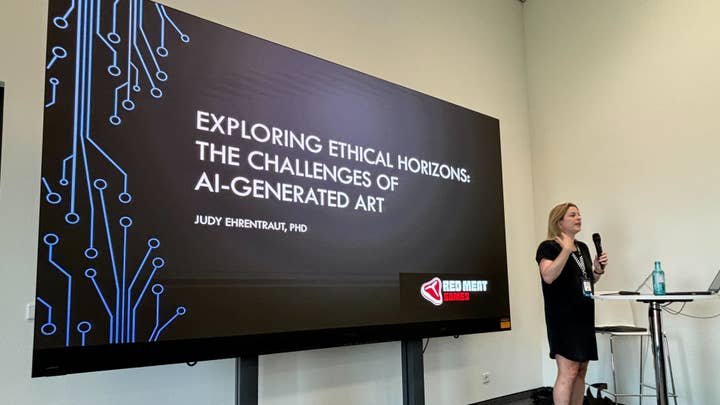Investigating the obstacles associated with using AI-generated art in the development of video games
At Devcom, Judy Ehrentraut, the creative content strategist at Red Meat Games, emphasized the significance of responsible AI training methods in gaming. She highlighted both the potential and limitations of these technologies.
Ehrentraut remarked, "AI is the biggest buzzword and it's either hyped as the new way to solve every productivity problem, or it's received with a groan," acknowledging its mixed reception.
She underscored that such technologies are neutral, and their ethical implications depend on their application.
Ehrentraut pointed out that AI's intelligence is often overstated. "AI is not intelligent in the way that we keep thinking that it is, or that people are hyping it up to be," she said. The technology learns from data, but lacks genuine human creativity, often blending existing artworks into something perceived as new art.
This has sparked debate among artists, many of whom cherish the creative process and are disheartened by AI's ability to produce art instantaneously, bypassing human effort and shared knowledge.
Removing human artistry from the process can dilute creativity to a bare minimum, especially as AI-generated images flood the internet and are used to further train AI, leading to repetitive outcomes.
Concerns about AI usage, particularly with tools like Midjourney and Dall-E, raise ethical questions due to their methods of aggregating art without artists' consents.
"AI is not intelligent in the way that we keep thinking that it is, or that people are hyping it up to be"
Red Meat Games has employed generative AI in developing its game, Moriarty, opting for Scenario instead of other controversial tools. This allows artists to input their work to train the AI, maintaining control over the source material.
Ehrentraut explained: "Our artists have drawn all of these things, and we're training Scenario to create more versions of our characters." This method supports rather than replaces the creative efforts by enhancing existing content for replayability, especially beneficial for smaller teams aiming for expansive artistic output.
She stressed the importance of control in this process, which Scenario provides: "I believe this is more ethical, as we're not so much training the AI from the ground up – the system already has a basic understanding of concepts and objects. What it's learning now is what you actually give it."
The aim is to establish a cooperative relationship between human creativity and AI, while ensuring transparency and responsibility in AI applications. "We need to think of AI as one [aspect] in a larger production so that it's not the artist or creator – it's just a tool that the artists and creators are using, and together everybody creates this thing we're then calling art," Ehrentraut concluded.
